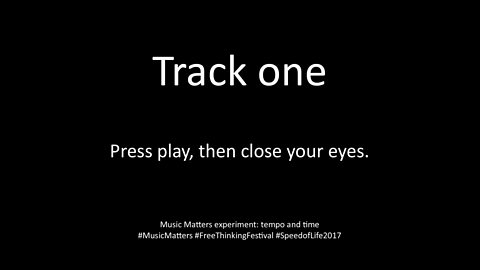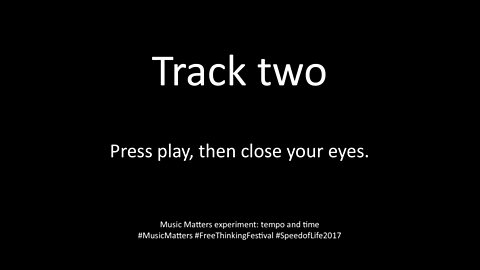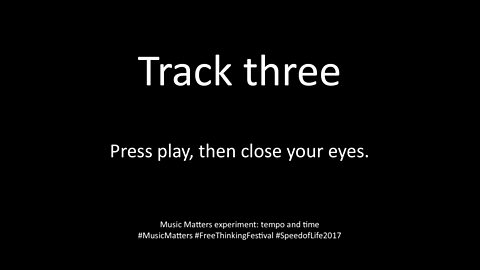Why music can literally make us lose track of time
Have you ever been so captivated by a piece of music that you’ve lost all sense of time? Or the opposite – been forced to listen to music so monotonous that you feared it would never end?

Scientists at the Free Thinking Festival may be able to explain why – and Radio 3 is getting involved. Join in online with a unique musical experiment.
This weekend, scientists are teaming up with Radio 3 listeners to explore how music affects our perceptions. In particular, they’re trying to find out how the tempo of music – i.e., how fast or slow it is – can affect our ability to judge the passing of time.
Professor Chris Petkov and a team of scientists from Newcastle's Institute of Neuroscience will be setting up shop this weekend at Sage Gateshead. They'll be asking Free Thinking Festival attendees to listen to specially prepared pieces of music and recording their reactions, before revealing the results live on Music Matters on Saturday 18 March.
We've borrowed some tracks to give you an opportunity to try out the experiment online.
- Listen to each of the tracks below before clicking to reveal more information about the music you’ve just heard.
- As soon as you’ve pressed play, shut your eyes and listen carefully to the music. Try to avoid peeking at the length of the track on the play bar – this will spoil the fun.
- As you listen, try to gauge how long each track lasts, in minutes and seconds.

Music Matters psychoacoustic experiment (1/3)
Can you estimate the approximate length of this track?
Click here to reveal the track's actual length
The music on this track lasted two minutes, 15 seconds. How close were you? If you made it within 20 seconds either way, give yourself a pat on the back.
Scientists have found that people tend to be fairly accurate in estimating how much time has passed when they listen to music with a fast, regular tempo, like this track.
However, a 2013 study found that people generally judge fast music as having lasted longer than equivalent tracks of a slower tempo. Curious.
Scroll down to listen to the next piece. Again, once you’ve pressed play, close your eyes and listen.
If you find it difficult to judge how much time has passed in minutes and seconds, perhaps just think about how long the next piece is in relation to the first one. Is it longer or shorter – and by how long?

Music Matters psychoacoustic experiment (2/3)
Can you estimate the approximate length of this track?
Click here to reveal the track's actual length
This piece was longer than the first one we heard, but only by five seconds. How did your estimate measure up?
You may have noticed some irregular changes in tempo. Tempi that change speed without warning like this tend to accentuate the time-warping effects of music. They also sound more realistic – after all, when’s the last time you heard live music played with absolute precision?
“We predict most people will say that this piece feels more natural and pleasant, and less regimented than a piece of music with very regular rhythm,” says Prof Petkov. “And in terms of time perception, we know that featuring irregular rhythms like this makes it more difficult for people to keep track of time.”
So don’t be surprised if you thought that this piece was actually SHORTER than the first one we heard. You were simply lost in the music.
Here's the final piece of audio.

Music Matters psychoacoustic experiment (3/3)
Can you estimate the approximate length of this track?
Click here to reveal the track's actual length
The music on this track went on for exactly the same as the previous track (two minutes, 20 seconds). How does that compare with your estimate?
If you managed to make it all the way to the end, you may have felt that it lasted considerably longer. That’s because of its slow, irregular tempo. In general, people find it more difficult to accurately predict how much time has passed when they listen to music with a slow tempo – and we know from the last track that irregular tempi make it even more difficult.
But in general, people exposed to slow tempi tend to think that the music has taken up more time than it actually has. This could explain why slow music can give us time to pause and reflect, but may also leave some people twiddling their thumbs.
That's not to say that everyone will react in the same way. Listening to music is an intensely personal experience: how we react to different tempi can depend on our musical background and experience, while age and musical preference may also be a factor.
All the music in this feature was composed and recorded by Ryan Calmus, a computer scientist, medical student, neuroscientist and closet classical composer from Newcastle University's Institute of Neuroscience.
Ryan and his colleagues will be conducting psychoacoustic experiments this weekend at the Free Thinking Festival at Sage Gateshead, where day tickets are available on a first-come, first-served basis. Tom Service will reveal the results live on Music Matters on 18 March: listen live and online via the Radio 3 website.
Radio 3 comes live from the Free Thinking Festival 2017 from 17-19 March, with all debates and lectures broadcast over the weeks that follow. This year's festival is devoted to the Speed of Life: browse all programmes, debates and talks via the Free Thinking Festival season page.
-
![]()
Music Matters: Music in the Time of our Lives
Tom Service reports on psychoacoustic experiments live from the Free Thinking Festival 2017.
-
![]()
Festival line-up
View highlights and download the 2017 festival programme in handy PDF format.
-
![]()
The Speed of Life 2017
Browse all the radio programmes coming from this year's festival on Radio 3's season page.
-
![]()
Nine intensely long musical marathons
Discover nine composers who revelled in experimenting with the constraints of time.




